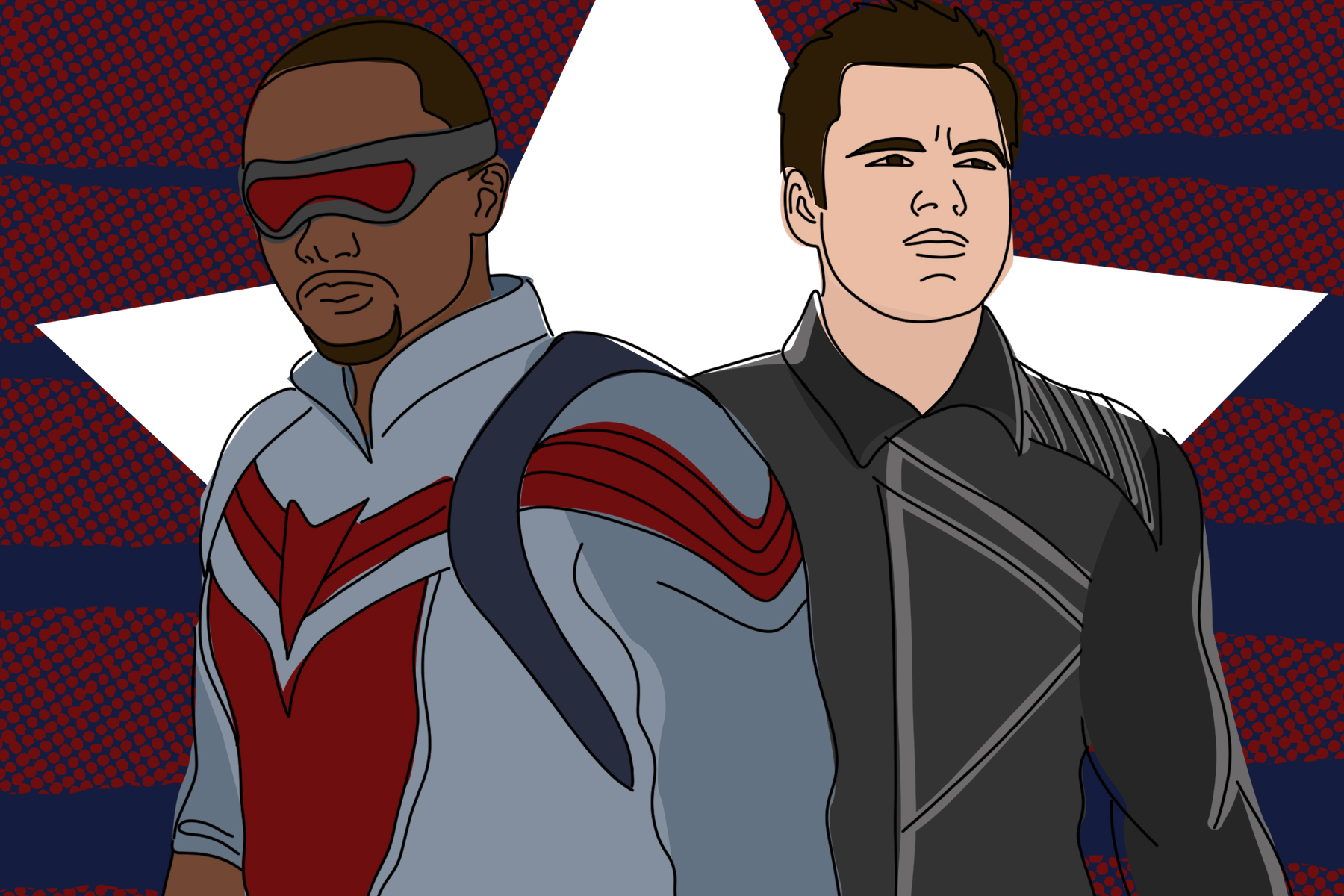In a world where aliens, monsters, robots and more seek to destroy Earth in an ever-expanding number of creative stories with characters from the stars, “The Falcon and the Winter Soldier” mini-series has been nothing short of refreshing. This grounded adventure about a man who can fly and a former mind-controlled assassin finding their way in the world has soared to the top and become one of the most viewed TV shows on Earth. Marvel fans would be silly to not expect greatness at this point, but this series differs from the franchise’s previous installments in a special way. Superheroes and their journeys are usually clouded by science fiction battles with laser guns, super-speed and many other colorful abilities. However, the character of Bucky Barnes seems to be struggling with something deeper than having to beat up adversaries throughout “The Falcon and the Winter Soldier”: post-traumatic stress disorder.
Post-traumatic stress disorder is a mental illness that was once believed to not even be real. It was only taken seriously after its impact became impossible to ignore in the wake of the Vietnam War, as American soldiers who had fought overseas were coming home. Throughout the years, awareness and education regarding PTSD have come to the forefront of the world’s understanding of mental illness. While it is most closely associated with people who have been to war, PTSD knows no boundaries. According to the American Psychiatric Association, PTSD can be defined as the struggles people experience after any kind of traumatic event, which can include flashbacks, hallucinations, disturbing thoughts and/or an overall onset of fear, sadness and distraction. In America, 1 in every 11 people become victims of PTSD in their lifetime. It is alarming to hear that sort of statistic, and it should be. So many people around the world battle with this obstacle, and too many of them have unfortunately fallen victim to the temptation of suicide that strongly correlates with this disorder.
James “Bucky” Barnes was introduced to the Marvel Cinematic Universe (MCU) in one of its first installments, “Captain America: The First Avenger.” He served as an encouraging best friend to Steve Rogers when he was a frail, dorky kid trying to sneak his way into the military, and then went on to serve alongside Rogers as he became Captain America in World War II. Eventually, after falling off a train in a desperate mission, Barnes was believed to have died as Rogers was forced to lead an army to victory while mourning the loss of his childhood friend. Seventy-plus years later, the truth was revealed.
Barnes’ body was discovered by the agent of an evil organization, HYDRA, where he was tortured and brainwashed to forget his entire life. After being injected with the re-creation of the Super Soldier Serum that gave Rogers his powers, Barnes was given important missions throughout history and kept alive through the use of cryogenic chambers after each mission. His job was simple: to kill. Under complete mind-control, Barnes became known as the Winter Soldier as he carried out dozens of deadly assassinations until the events of “Captain America: The Winter Soldier” unfolded. Each time he saw Rogers, the Winter Soldier remembered more and more about who he truly was. In a climactic ending, in which he ruthlessly defeated Rogers and threw him into a lake where he was presumed left for dead, the closing scene revealed the metal arm of the Winter Soldier that had grabbed Rogers and carried him to shore and safety.
Barnes’s true redemption did not begin until “Captain America: Civil War,” though. As he escaped from HYDRA and hid from the world that was after him for his decades of war crimes, he began the adventure of discovering who he was. Throughout the movie, Barnes’s PTSD is evident as he slowly realizes the things he was forced to do and the weapon he was forced to become. In one scene, he can be seen trying to buy plums, which are known to help people recover memories. Now, with Rogers presumably dead and the United States government pardoning Barnes for his crimes, the spotlight is on Barnes in the “The Falcon and the Winter Soldier” series.
Marvel has not brushed Barnes’ past to the side; it is actually the entire focus of his character. Several scenes have been dedicated to his therapy, which consists of him trying to find forgiveness for himself. He is shown to not enjoy socializing or trusting people, not even his therapist; this is one of the main effects of PTSD, as Barnes struggles to even operate alongside fellow Avenger Sam Wilson. He talks of the brief moment of peace he had in Wakanda after the events of “Captain America: Civil War,” mentioning that it was the only time he wasn’t fighting in life. In another key scene, Barnes is forced to confront former foe Isaiah Bradley, where he is once again reminded that his killings will follow him like a black cloud and that he cannot just “decide” who he is when his actions tell a different story. Barnes’ feelings seem to come to a breaking point in the third episode of the series when he is forced to step back from the role of the Winter Soldier to disguise himself as he effortlessly falls back into his old ways.
The overwhelming guilt that may come with PTSD is also displayed heavily throughout the series. Barnes keeps a journal full of people’s names he has hurt as the Winter Soldier, as he seeks redemption for his actions and forgiveness from these people. In perhaps the most important moment of the series thus far, Wilson and Barnes sit across from each other while Barnes criticizes him for giving up the infamous Captain America shield. Barnes suddenly gains clarity and a certain rage for himself as he emotionally spews, “Steve believed in you … maybe he was wrong about you, and if he was wrong about you, maybe he was wrong about me.”
This scene is heartbreaking because it showcases Barnes’s lack of comfort in his own body. The memories from his days as the Winter Soldier torment him and he is reminded at nearly every corner of what he has done. This mirrors the realities of so many people who face the chaotic effects of PTSD. The overwhelming sense of being confused with reality and how it is possible for a person to endure so much is reflected in Barnes’ emotions as he struggles to grasp who he is and what he’s been through.
Marvel actor Sebastian Stan has articulated this with perfect precision: The way Stan pauses with each word, the way his speech is slowed when speaking about the past and how quickly his emotions can turn from calm to chaotic in the snap of a finger are all common elements of PTSD. The way Marvel has made therapy and trust such an integral part of this character’s arc continues to shine a light on the impacts of this mental illness. Yet the most important part of Marvel and Stan’s depiction of Barnes is that he has not shed an ounce of resolve. Barnes continues to possess his desire to be a hero and does not give up in the face of the chaotic fire in his mind and soul.
As somebody that has been diagnosed with PTSD, seeing a badass superhero face the same demons that I do has not only been inspiring and comforting, but gives me hope that people around the world can find more understanding for the struggles so many people are forced to confront daily. As “The Falcon and the Winter Soldier” mini-series continues to stream on Disney+, keep an eye out for what will happen next for this special character.

















